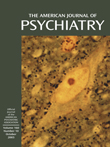Mortality and Poststroke Depression: A Placebo-Controlled Trial of Antidepressants
Abstract
OBJECTIVE: Poststroke depression has been shown to increase mortality for more than 5 years after the stroke. The authors assessed whether antidepressant treatment would reduce poststroke mortality over 9 years of follow-up. METHOD: A total of 104 patients were randomly assigned to receive a 12-week double-blind course of nortriptyline, fluoxetine, or placebo early in the recovery period after a stroke. Mortality data were obtained for all 104 patients 9 years after initiation of the study. Demographic and clinical measurements were collected at 3, 6, 9, 12, 18, and 24 months after the stroke. Survival data were analyzed by using the Kaplan-Meier method. RESULTS: Of the 104 patients, 50 (48.1%) had died by the time of the 9-year follow-up. Of 53 patients who were given full-dose antidepressants, 36 (67.9%) were alive at follow-up, compared with only 10 (35.7%) of 28 placebo-treated patients, a significant difference. Logistic regression analysis showed that the beneficial effect of antidepressants remained significant both in patients who were depressed and in those who were nondepressed at enrollment, after the effects of other factors associated with mortality (i.e., age, coexisting diabetes mellitus, and chronic relapsing depression) were controlled. There were no intergroup differences in severity of stroke, impairment in cognitive functioning and activities of daily living impairment, and other medications received. CONCLUSIONS: Treatment with fluoxetine or nortriptyline for 12 weeks during the first 6 months poststroke significantly increased the survival of both depressed and nondepressed patients. This finding suggests that the pathophysiological processes determining the increased mortality risk associated with poststroke depression last longer than the depression itself and can be modified by antidepressants.



